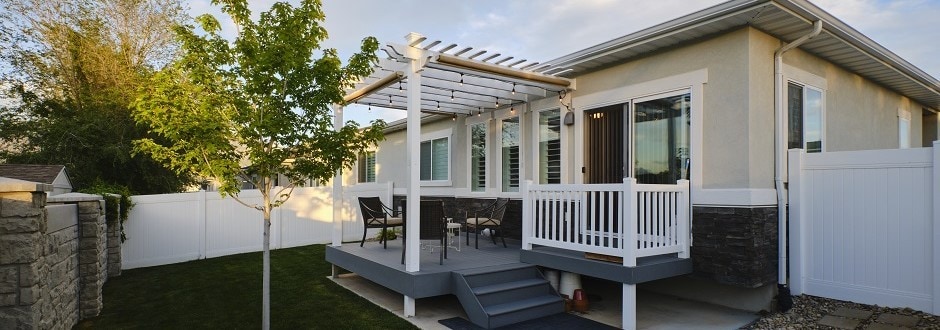Last updated: June 09, 2025
How to use a cash out refinance to buy an investment property

Using a cash out refinance to buy investment property is a popular way for seasoned real estate investors to increase their portfolio size and diversify their holdings. However, you may prefer an alternative option like a conventional refinance or home equity loan.
Using a cash out refinance to buy an investment property
When used correctly, using a cash out refinance to buy an investment property may offer savvy investors the opportunity to generate income or acquire property at attractive rates.
- Cash out refinancing allows homeowners to receive cash by refinancing their existing mortgage for more than they owe.
- To qualify for a cash out refinance to buy a second home, lenders assess factors such as equity, credit score, debt-to-income (DTI) ratio, and loan-to-value (LTV) ratio.
- Alternatives to a cash out refinance may include a home equity line of credit (HELOC), home equity loan, and conventional rate-and-term refinance.
How does a cash out refinance work?
A cash out refinance lets you refinance your home for more than you owe. Typically, a lender will pay you majority of the difference between the new loan amount and your current mortgage, which you can use for home improvements, debt consolidation, education, a new property, or anything you like.
You must have built up a certain amount of equity for a cash out refinance. Specific requirements and limits vary by lender and state or local regulations.
How does buying a second home with a cash out refinance work?
One of the exciting prospects of a cash out refinance is that you can use your equity to buy another home while retaining ownership of your first home. A lender will assess whether you're eligible, and if your application is successful, you can use the funds from your cash out refinance to buy an investment property.
How much money can you get with a cash out refinance?
How much cash you could get with a refinance depends on your available home equity and other factors, including:
- Income. You need consistent income to qualify for a cash out refinance. Specific income requirements depend on your unique situation.
- Credit score. Most lenders have a minimum credit score requirement. A higher credit score may help you qualify for better rates and how much cash you could get with a refinance.
- Debt-to-income (DTI). Your DTI ratio measures your monthly debt payments (such as credit card bills, car payments, and mortgage payments) against your monthly income. Lenders typically prefer a DTI lower than 43%, although some may accept higher ratios.
- Loan-to-value (LVT). Your LTV ratio is your current mortgage balance divided by the appraised value of your home. For example, if you have a loan balance of $200,000 and your home is appraised at $400,000, your LTV ratio would be 50%.
Keep in mind that specific requirements for a cash out refinance, including some not listed here, vary from lender to lender. Compare lender criteria before applying for a cash out refinance.
Considering a cash out refinance? Discover® Home Loans offers low fixed rates on mortgage refinancing up to 90% LTV with $0 application fees, $0 origination fees, $0 appraisal fees, and $0 costs due at closing.
Do you pay taxes on a cash out refinance for an investment property?
Because cash out refinances let you pull equity from your home, you won’t pay taxes regardless of how you use the cash. In fact, the funds could be tax deductible if you use the cash out refinance for qualifying expenses, such as a home renovation or an investment property. Consult with a tax professional before getting a cash out refinance to see whether you might be eligible for a tax deduction.
Should you buy a second home with a cash out refinance?
Buying a second home with a cash out refinance may be a lucrative financial investment. However, you should evaluate your financial situation before making that decision.
Be sure to consider the expenses of owning a second property, such as property taxes, homeowner's insurance, maintenance costs, and utilities. Calculating these potential costs helps you determine whether buying a second home with a cash out refinance is right for you.
Other uses for a cash out refinance
You can use the funds from a cash out refinance in various ways beyond purchasing an investment property.
Many homeowners use a cash out refinance to help finance home renovations, repairs, or upgrades. These activities may increase the value of your home.
A cash out refinance may also be an excellent tool for debt consolidation as mortgage rates tend to be lower than rates for credit cards and other types of finance. Check rates and closing costs before using money from a cash out refinance for debt consolidation.
Other uses for a cash out refinance may include:
- A second home purchase
- Educational expenses
- A major purchase or emergency expense
- Lowering your mortgage rate (if today’s rate is below the rate on your primary mortgage) or changing your loan terms
Cash out refinance alternatives
While a cash out refinance can be a great option in some situations, it might not be right for you. There are alternative lending options that provide cash to purchase a second home.
Home equity line of credit (HELOC)
A HELOC is another option for borrowing against your home's equity. Instead of receiving a lump sum upfront, a HELOC lets you borrow money as needed up to a specific credit limit. As a second mortgage, a HELOC won’t replace your current mortgage and may be an option if you’re looking for flexibility when borrowing against your home's equity.
Rate-and-term refinance
A rate-and-term refinance replaces your current mortgage with a new loan, possibly with a lower interest rate or a shorter term to save interest over time. Since it's a conventional loan, you might be eligible for a higher loan limit, no mortgage insurance or other benefits.
If homeowners save money with a rate-and-term refinance, those savings could go toward a down payment on an investment property.
Home equity loan
A home equity loan is a second mortgage where you borrow against the equity in your current home. Unlike a cash out refinance, this loan doesn't replace the existing mortgage on your property. Instead, it lets you borrow a lump sum upfront and pay it back over time, often with fixed interest rates. A home equity loan is an option for individuals who want a set amount of money upfront without refinancing their existing mortgage.
Closing thoughts: Using a cash out refinance to buy an investment property
Understanding the requirements of a cash out refinance and how it works, could help you purchase a second home. The amount of money you will receive depends on factors such as your credit score, home equity, LTV ratio, and DTI.
If a cash out refinance isn't for you, there are other ways to obtain funds for an investment property, such as a home equity loan, HELOC, or a conventional rate-and-term refinance.
By making educated decisions about financing your investment property through a cash out refinance—or another option—you can make your money work for you.
If you’ve checked recent rates and are ready to apply with Discover® Home Loans, look over this list for what to expect during the mortgage refinance application process.
Please note: Discover Home Loans offers home equity loan and mortgage refinance opportunities, but does not offer HELOCs.
- Main
-
The information provided herein is for informational purposes only and is not intended to be construed as professional advice. Nothing contained in this article shall give rise to, or be construed to give rise to, any obligation or liability whatsoever on the part of Capital One, N.A. or its affiliates.

Find your low,
fixed rate
Use our Monthly Payment Calculator to find a rate and payment that fit your budget.
- Main
-
Start your application online or give us a call.
Discover Home Loans Restrictions and Details
We do not lend in IA or MD. You are not guaranteed approval. Once you apply and submit your credit and property information, we will confirm your eligibility. We don’t lend on cooperatives, condotels, investment properties, log homes, manufactured homes, mobile homes, or secondary homes. We will only originate one 1st lien mortgage per property per 12-month period. The maximum loan amount you qualify for will depend on additional factors, including type of loan, lien position, loan-to-value and your credit history. We may change rates, program terms, and conditions without notice. Discover Card accounts and other Capital One accounts (with the exception of Discover home and personal loans) may not be paid off with this home loan. All loan programs are offered by Capital One, N.A., 2500 Lake Cook Road, Riverwoods, IL 60015. NMLS ID 453156.
Loan Payment Example Disclosure
For example, if you borrowed $60,000 for a 20 year term at 8.86% APR, your fixed monthly payments would be $534.45.
